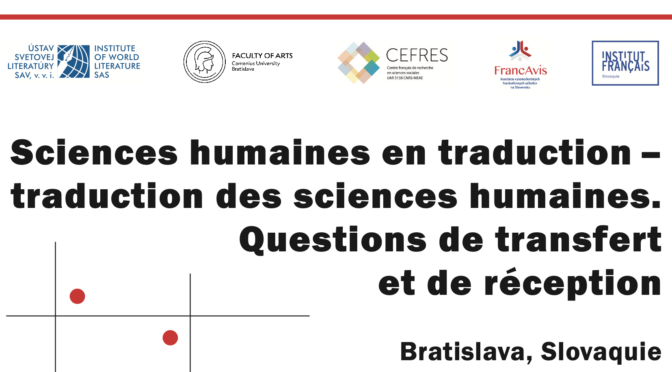Kdy: 15. a 16. května, 2025
Kde: Ústav svetovej literatury SAV, Bratislava, Slovensko
Jazyk: francouzština, angličtina
Organizační tým: Katarína Bednárová, Silvia Rybárová, Ján Živčák (Ústav svetovej literatury SAV)
Odkaz na výzvu k podávání přihlášek zde
Kompletní program v angličtině ke stažení zde.
Oficiální plakát zde.
Mezinárodní konferenci společně pořádají Ústav svetovej literatury SAV (Bratislava), Filozofická fakulta Univerzity Komenského v Bratislavě a CEFRES.
Foto: Mgr. Lucia Drotárová, PhD. Vytvořeno pomocí nástroje AI.
Program
Wednesday 14 May – arrival of participants
Thursday 15 May
9 AM: Opening of the conference
9:30 AM: Plenary conference
Judith Woodsworth (Montreal)
Translating the Social Sciences and Humanities: Blurring the Boundaries between Communication and Expression
10:30 AM: Coffee break
10:50 AM: Round Table (in French)
Chair: Katarína Bednárová (Bratislava)
Participants: Tatiana Milliaressi (Lille), Maud Gonne (Liège), Barbara Brzezicka (Gdańsk), Miroslav Marcelli (Bratislava, Prague), Josef Fulka (Prague)
12:50 PM: Lunch
2 PM: Session 1
Duncan Large (Norwich)
Non-Fiction Translation and the Limits of the Literary
Eugenia Kelbert Rudan (Bratislava)
The Limits of Translation: A Language Contact Approach
Katarína Bednárová (Bratislava)
De la non-traduction à la traduction : trajectoires et limites du traduire dans l’espace textuel des sciences humaines
Anikó Ádám (Budapest)
Penser global, traduire local
4 PM: Coffee break
4:30 PM: Session 2
Robert Lukenda (Germersheim)
A (New) ‘Popularisation’ of the ‘Popular’? On the Current Change in Bourdieu’s Reception in and through Translation into German
Céline Letawe (Liège)
Simone de Beauvoir par le truchement d’Alice Schwarzer : invisibilisation de la traduction et réappropriations
Isabelle Poulin (Bordeaux)
Usages du roman. Comment vivre ensemble (Roland Barthes) – How to live together (tr. Kate Briggs) en plus d’une langue ?
Elisaveta Popovska (Skopje)
Traduire les sciences humaines de la langue d’origine en langue dite mineure : la traduction du Plaisir du texte de Roland Barthes du français en macédonien
7:30 PM: Dinner
Friday 16 May
9 AM: Session 3
Vera Viedhöver (Liège)
« Mettre en œuvre » la pensée d’Henri Meschonnic. Expérience collective et subjective lors du transfert de la poétique du rythme dans l’espace germanophone
Françoise Wuilmart (Brussels)
Pourquoi fallait-il impérativement retraduire certaines œuvres de Stefan Zweig, à l’exemple de Marie-Antoinette et de Magellan
Manuel Pavón-Belizón (Barcelona)
Translating Rodó’s Ariel into Chinese. Consonances and Dissonances of an Intellectual Intervention
Anastasia Belousova (Bogotá) – Vera Polilova (Sibiu)
Skaz, Siuzhet and Byt: Russian Formalism in Spanish Translation
11 AM: Coffee break
11:30 AM: Session 4
René Lemieux (Montreal)
Retraduire un concept inapproprié : le cas de la retraduction de La pensée sauvage de Claude Lévi-Strauss en anglais, ou Quand la rectitude politique se mêle de retraduction
Florence Xiangyun Zhang (Paris)
Concept ou mot composé : le cas de « négritude » en traduction
Daniele Speziari (Ferrara)
Traduire la grammaire dans l’espace francophone à la Renaissance
Florencia Ferrante (Genoa)
“The Jansenist Case for Translation”: Religious Reform and Translation Practices in 18th-Century Italy
1:30 PM: Lunch
2:40 PM: Session 5
Ildikó Józan (Budapest)
Des chaînes de lettres inanimées ? Sciences humaines en traduction en Hongrie dans l’entre-deux-guerres
Elżbieta Skibińska (Wrocław)
La revue Literary Studies in Poland/Etudes Littéraire en Pologne : traduction au service de la diffusion de la pensée humaniste polonaise
Oleksandr Kalnychenko (Kharkiv) – Lada Kolomiyets (Kyïv)
Humanities Translations in Ukraine in the 1920s–1950s
Triin van Doorslaer (Tallinn)
Translating Transition: Scientific Literature in Post-Soviet Estonia (1990–1999)
Ľudmila Pánisová (Nitra)
Behind the Iron Curtain: Slovak Translations of American Philosophy before 1989
5:10 PM: Coffee break
5:30 PM: Conference closing
Synthesis prepared by Françoise Wuilmart (in French)

